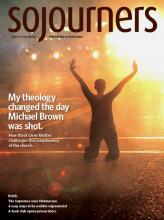SINCE HIS ELECTION IN 2013, Pope Francis has been widely praised. But in this interview, conducted by Italian journalists Andrea Tornielli and Giacomo Galeazzi before the release of the encyclical “Laudato Si’,” Pope Francis speaks about the environment and economic justice; his perspectives on these topics have elicited harsh criticism from some.
How important is it for Christians to recover a sense of care for creation and sustainable development? And how do we ensure that this is not confused with a certain environmentalist ideology that considers humanity the real threat for the well-being of our planet?
Pope Francis: For the protection of creation we must overcome the culture of waste. Creation is the gift that God has given to humanity so it can be protected, cultivated, used for our livelihood, and handed over to future generations. The vocation to take care of someone or something is human, before being Christian, and affects all; we are called to care for creation, its beauty, and to respect all creatures of God and the environment in which we live. If we fail in this responsibility, if we do not take care of our brothers and sisters and of all creation, destruction will advance. Unfortunately, we must remember that every period of history has its own “Herods” who destroy, plot schemes of death, disfigure the face of man and woman, destroying creation.
But when humanity, instead of being custodian, considers itself to be the master, it ... moves toward destruction.
Read the Full Article

